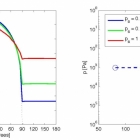The Josephine Lawrence Hopkins Foundation Colloquium Presents: Atmospheric circulation and collapse on tidally locked exoplanets
Many rocky exoplanets around red dwarf stars are likely to be tidally locked, with permanent day and night sides. In such cases, condensation of the atmosphere on the planet's night side can occur if the cross-hemispheric energy transport is sufficiently weak. Understanding when and why this happens is a fundamental challenge for theorists because atmospheric collapse will affect phase curve interpretation, exoplanet habitability, and many other issues. Here I discuss new work on this problem using a hierarchical approach. I show that over a wide range of parameters the atmospheric boundary layer, rather than the large-scale circulation, is the key to understanding the planetary energy balance. I present a scaling analysis that predicts the day-night temperature difference using only external parameters. I then compare these results to a range of cases studied using a full 3D climate model with realistic band-resolved radiative transfer, and discuss the implications for observables and for habitability.

